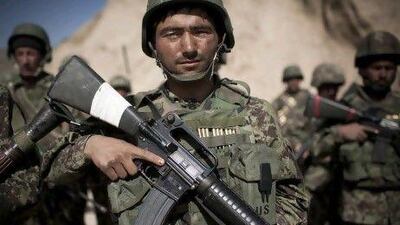GARDEZ, AFGHANISTAN // They say their M16s are dust-prone antiques. Their boots fall apart after a couple of months, they complain, and many of their helmets are cracked and patched. Yet they set out on patrol.
They are the men of the Afghan National Army, the critical part of the huge machine being built to protect Afghanistan's security after the Nato alliance is gone in less than three years.
With Afghanistan topping the agenda at a gathering of Nato leaders in Chicago, Afghan army officers and enlisted men in Logar and Paktia provinces are sending a mix of messages.
The foreign forces are leaving too soon, the men say. Why then are attacks by Afghan soldiers on Nato forces increasing, killing 35 last year and 22 so far this year? Because the Afghans feel disrespected, the soldiers say. Handing out inferior equipment is disrespectful; burning Qurans, however accidental, is disrespectful; urinating on dead bodies, even Taliban, as video that emerged in January showed US troops doing, is disrespectful.
Washington spent more than US$20 billion (Dh73.4bn) in 2010-2011 on training and equipping a 352,000 strong army and police force - one of the costliest projects ever undertaken by the Pentagon.
Yet the footsoldiers don't have night-vision goggles to go after the Taliban under cover of darkness.
At the rock-strewn firing range of the 203 Thunder Corps in Paktia province, Sergeant Said Aga recalled his M16 jamming in the middle of a firefight with the Taliban, and grimaced as his young charges aired their gripes about the Vietnam-era firearm.
"The Americans have really much better equipment than us," he said. "Our vehicles and weapons are very weak compared to theirs."
A soldier named Abdul Karim said he'd prefer a 30-year-old Kalashnikov to an M16. The Americans "are giving us old weapons and try to make them look new with polish and paint. We don't want their throwaways," he said.
In Kabul, US Lieutenant Colonel Timothy M Stauffer rejected the complaints about ageing weapons, saying the Afghans get basically the same firearms that US soldiers have. "The equipment they are asking for and are being issued is sufficient to meet the current threat."
Most American troops in Afghanistan carry the M4, a shorter version of the M16. Both models have been criticised by some in the military for jamming in harsh conditions and requiring greater maintenance. The Kalashnikov is known as an easier-upkeep, all-conditions weapon, fuelling its popularity in the developing world.
At the firing range, the complaints flew thick and fast. Colonel Abdul Haleem Noori grabbed a young recruit's foot to show a gash in the heel of his boot.
"It's only two months old and it is falling apart, and we are told it is supposed to last one year," he said. The footwear was made by a manufacturer under contract to the Afghan defence ministry.
Even the army band bemoans their equipment, including soldered trumpets dating back to the 1970s.
The conversation with Sgt Aga, the firing range instructor, shifted from poor equipment to the disturbingly high number of so-called "green-on-blue" attacks, a US military term for Afghan soldiers killing their Nato counterparts.
Sgt Aga gave off a strange mix of resentment, envy and appreciation. He did not want the international soldiers to leave. "We still need them to bring peace," he said.
Then he explained the issue of respect.
When foreign forces patrol with Afghan forces, "they don't respect us. When we see that they don't have respect we get angry. Even myself, I have seen how they behave in Afghanistan. They have sometimes been cruel. I saw in operations they have entered mosques, I have seen this myself."
Another complaint: the foreigners don't let civilians drive in front of their convoys even if they are rushing a sick person to treatment, referring to the heavy security measures US troops impose around their vehicles.
Colonel Ahmed Jan Ahmedzai said incidents like the mistaken burning of Qurans at Bagram Air Base makes recruits susceptible to Taliban overtures. New recruits are watched carefully for signs of sympathy for the Taliban, he said.
Because of the attacks, international soldiers are no longer present at firing ranges, said Colonel Asif Khan Saburi, in charge of recruit training in five provinces.
"When we have shooting practice I have to look at two things: how my soldier is shooting and that he doesn't fire at the US soldiers."

